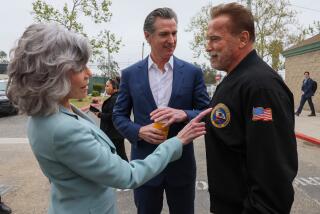Obama vows ‘everything we’ve got’
Reporting from Washington — Obama calls on nation to alter its ways
He urges Americans to end oil ‘addiction,’ and says he’ll use
every tool to fight the spill.
Seeking to reassure Americans that his administration can handle the growing Gulf Coast oil crisis, President Obama promised Tuesday in his first address from the Oval Office to hold BP accountable for all costs and to “use everything we’ve got” in the federal response to the calamity.
Hours earlier, the scale of the problem widened dramatically when federal officials said in new estimates that the spill is at least 50% greater than previously known.
Obama, answering the catastrophe with an activist government philosophy, described a series of steps to overhaul federal oil industry oversight and to restore the Gulf of Mexico region.
The president also made a politically risky request that Americans accept a measure of responsibility by recognizing the need to change the country’s consumption of oil.
“For decades, we’ve talked and talked about the need to end America’s century-long addiction to fossil fuels. And for decades, we have failed to act with the sense of urgency that this challenge requires,” Obama said. “The consequences of our inaction are now in plain sight.”
Obama pledged that BP executives would pay for the impact of the accident and alluded to the escrow account he wants the British company to set up to pay those affected by the crisis. He said he would push for that step in a White House meeting with company officials Wednesday.
He also named a new “spill czar,” former federal prosecutor Michael Bromwich, who will be charged with accelerating reforms in the regulation and oversight of offshore drilling. And he announced a long-term restoration plan to be drafted by former Mississippi Gov. Ray Mabus, the Navy secretary.
Obama seized on the debacle in the gulf to push for a comprehensive energy bill that will promote alternatives to fossil fuels.
“The tragedy unfolding on our coast is the most painful and powerful reminder yet that the time to embrace a clean energy future is now,” he said.
Although his statement was not as specific as some environmentalists might have wanted — he did not even mention global warming — Republicans viewed it as an effort to promote his proposal to tax companies for their carbon emissions.
The address embodied an implicit message that Obama is committed to taking charge of a situation Americans consider to be out of control. His prime-time message was delivered on a day when the president originally had been scheduled to be in Indonesia on a tour with his family. His choice to make the speech from the Oval Office — where George W. Bush addressed the nation after the Sept. 11 attacks and where Bill Clinton explained himself at the time of his impeachment — underscored the singular status Obama assigns to the gulf crisis.
The president’s high-profile effort comes at a time when many critics, including fellow Democrats, believe the federal government has been clumsy and tardy in its response.
A poll released Tuesday by the Associated Press found that 52% of those surveyed did not approve of Obama’s handling of the spill, up sharply from a month ago. But many more were critical of BP: 83% disapproved of the company’s performance after the April 20 oil rig explosion that triggered the crisis.
In the meantime, members of Congress are looking to the White House to shore up confidence in the government’s competence in an election year when that issue is front and center.
“The reliance on BP for information has been a big mistake,” said Sen. Benjamin L. Cardin (D-Md.). “But that’s spilt milk — spilt oil. BP is responsible, but the government’s in control. We can’t be confused about who’s calling the shots. It’s going to be our call, not BP’s.”
Obama’s push for a broader energy bill is considered a longshot at a time when Congress is struggling with less controversial measures.
“I can’t think of anything more inappropriate than to suggest that a national energy tax is an appropriate reaction to this environmental disaster in the gulf,” said Senate Republican Leader Mitch McConnell (R-Ky.), accusing the White House of exploiting a crisis to advance an unrelated agenda.
Senate Assistant Majority Leader Richard J. Durbin (D-Ill.) said he was open to the possibility that Obama’s speech could help build momentum for far-reaching climate-change and energy legislation in Congress, but that will be tough sledding.
“If he is successful at linking the disaster in the gulf to the broader energy issue, we may spark a new debate,” Durbin said. “It’s important, it’s timely, but it is a tough political issue.”
Much of Obama’s message has been previewed in the gulf region, most recently in a trip to Pensacola, Fla., earlier in the day. While there, he talked about the mass of oil off the coast, the closed fishing waters, the tar balls washing up onshore. This is an “assault on our shores,” he said, and “we’re going to fight back with everything we’ve got” — a statement he would reiterate in his televised address.
The doubt of that was evident as the motorcade passed by people on the streets, some holding aloft signs of support and others expressing dismay.
“We need action, not words,” said one sign.
More to Read
Sign up for Essential California
The most important California stories and recommendations in your inbox every morning.
You may occasionally receive promotional content from the Los Angeles Times.












